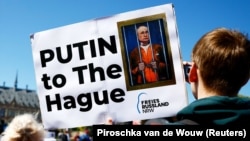European Union foreign ministers are gathering in Warsaw on May 7-8 for an informal council meeting and then head to Lviv a day later in a show of solidarity with Ukraine as Russia plays up its Victory Day celebrations.
Neither of the meetings is an official EU council, so they're unlikely to announce anything concrete. But the foreign ministers are expected to get the ball rolling on the creation of a special tribunal to investigate and hold Russia accountable for crimes of aggression committed in Ukraine.
The Special Tribunal for the Crime of Aggression Against Ukraine, as it's called, will then be formalized in Luxembourg on May 14 when the Council of Europe's Committee of Ministers meets.
What Is The Special Tribunal for the Crime of Aggression Against Ukraine?
Shortly after Russia launched its full-scale invasion of Ukraine in February 2022, the International Criminal Court (ICC) opened an investigation into allegations of war crimes, crimes against humanity, and genocide committed by Russian forces. This includes offenses taking place on Ukrainian territory dating back to the Maidan Revolution that started in November 2013.
The new tribunal would look into what are called crimes of aggression, over which the ICC lacks jurisdiction. It would be an international court rooted in Ukrainian jurisdiction with a so-called legal personality under international law, Ukrainian law, and the law of the host country, which has yet to be determined -- initially thought to be the French city of Strasbourg, as that's the official seat of the Council of Europe, but the tribunal may end up in The Hague.
What Constitutes A Crime Of Aggression?
According to the draft statute of the tribunal, seen by RFE/RL, a "crime of aggression" means "the planning, preparation, initiation or execution, by a person in a position effectively to exercise control over or to direct the political or military action of a State, of an act of aggression which, by its character, gravity, and scale, constitutes a manifest violation of the Charter of the United Nations."
The statue further notes that an "act of aggression" means "the use of armed force by a state against the sovereignty, territorial integrity, or political independence of another state."
Many of the actions Russia has undertaken in recent years such as occupations, annexations, naval blockades, and bombardments of both civilian and military targets in Ukraine (though it denies targeting such infrastructure) constitute acts of aggression. In legal terms, Russia's invasion is regarded as an "unjust war" or a "war of conquest."
The term "crime of aggression" thus carries a wide scope, which can also include actions seen as war crimes or genocide. The tribunal will work closely with the ICC in the division of cases.
The tribunal would have the power to "investigate, prosecute, and try persons who bear the greatest responsibility for the crime of aggression against Ukraine."
Crimes of aggression are, in other words, what are known as "leadership" crimes, committed by, as the text notes, "a person in a position effectively to exercise control over or to direct the political or military action."
This would include politicians in Russia, and potentially those in other countries that have contributed to undermining Ukraine’s territorial integrity -- namely Belarus, Iran, and North Korea.
Does Putin Have Immunity From Prosecution?
Russian President Vladimir Putin and those in his inner circle do have immunity from prosecution while in office under what is known as a "triangle of immunity" for sitting presidents, prime ministers, and foreign ministers. This often includes defense ministers, as well.
This immunity can technically only be waived by the United Nations, but given that Russia is a permanent member of the UN Security Council even this technicality becomes rather academic.
It's most likely the tribunal will see a lot of "in absentia" hearings and rulings, which according to the draft statute will be possible.
What Will The Tribunal Do, Exactly?
A core group of countries has been gathering evidence together with Ukraine since 2023, so the work is already well under way. It's a bit like "a legal 'coalition of the willing'" with some 40 countries, including most of the 27 EU member states minus Hungary and Slovakia; the G7 countries bar the United States, which recently signaled it won't take part; and other Council of Europe countries. Any nation can, however, join at any time.
A management committee consisting of officials from the core group will now select judges and a prosecutor. The draft statute notes that "the judges of the Special Tribunal shall be persons of high moral character, impartiality, and integrity who possess the qualifications required in their respective countries for appointment to the highest judicial offices. They shall be independent in the performance of their functions and shall not accept or seek instructions from any Government or any other source. No two judges may be nationals of the same State."
The prosecutor will be elected through a secret ballot by an absolute majority of the management committee for a period of seven years.
If a party is found guilty by the tribunal, they could face anywhere from a few years in prison to a life sentence, as well as fines. Those convicted will serve their sentence in a state that has concluded a specific agreement with the tribunal. If there is no such country, "the sentence may be served in Ukraine."












